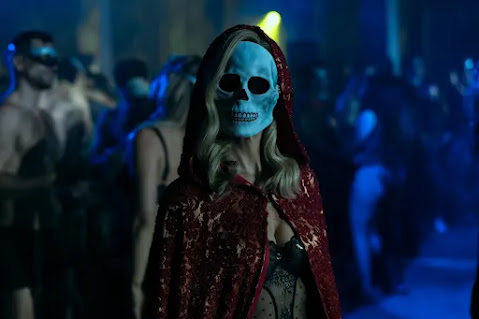Carla Gugino as Verna in episode 2 of The Fall of the House of UsherEike Schroter—Netflix
The Fall of the House of Usher is one of Edgar Allan Poe's most famous short stories, known for its dark Gothic atmosphere and haunting conclusion. As the unnamed narrator arrives at the decaying mansion to visit his friend Roderick Usher, a sense of doom and melancholy pervades every aspect of the setting. Over the course of the story, tensions mount until finally reach a shocking and brutal climax. Let's take a closer look at the complex ending and what it reveals about Poe's masterful use of Gothic themes and symbolism.
When we last left the story, Roderick's sister Madeline had been buried alive after falling into a cataleptic trance and being pronounced dead. The narrator remains with Roderick to comfort him in his declining mental state. However, Poe sets the stage for the terrifying conclusion. Madeline had been interred in a vault "just below" the house, almost as if still haunting the premises from beyond the grave. Roderick also expresses a belief that the House of Usher is psychically linked to himself and Madeline, and their fate is intertwined.
In the pivotal climax, a piercing shriek rings out in the night. Roderick mutters "These are the wails of the pit!" implying some hellish force has been unleashed. The two men race to Madeline's tomb only to find she has emerged, presumably having awakened during her premature burial. Poe leaves ambiguous how long she may have been trapped conscious in the underground chamber. Madeline appears at the house entrance "yet enshrouded" like a vengeful apparition rising from the dead.
Upon encountering her brother and the narrator, Madeline utters not a word. Instead, she silently collapses and expires, fulfilling the doom that Roderick had predicted for the House. Some key questions remain - did she die from suffocation in the vault, or merely from the shock of being reunited with Roderick? In any case, her appearance and death thrust the story to its darkest moment.
No sooner does Madeline hit the floor than a "shrill and long-kept up shriek, half of horror and half of triumph" escapes Roderick. It is his final expression of the maddening anxiety and psychic link that has tortured him throughout. Concurrently, "a fierce breath of the whirlwind" blows through the dwelling, followed by "a shattered ruin" where the house had stood. As Roderick foretold, the literal crumbling and collapse of the house coincides perfectly with the extinction of the Usher bloodline.
Poe uses this ending to explore profound Gothic themes of fate, inheritance, the sins of the fathers being visited upon their children, and the symbolic relationship between family and place. The house, long a symbol of decayed aristocracy, proves as fragile as the lineage it contains. Roderick is the last surviving Usher, and with Madeline's death, his own imminent end is inevitable. His final cry suggests a twisted triumph in fulfilling his own grim prophecy.
Through the brutal and mysterious ending, Poe ties together the complex threads of symbolism that have built over the course of the story. The house, the family, Roderick's psyche, and Madeline's premature burial all come crashing down in a cataclysmic conclusion that leaves the reader unsettled. Poe demonstrates his unparalleled skill at weaving Gothic mystery, atmosphere and poetic justice into a dark tale whose impact still resonates with readers today. The Fall of the House of Usher remains one of his most chilling and critically analyzed short works for its brilliant narrative structure and haunting finale.
Thank you for reading! Hearts and tips are
always greeting and your support is very much respected.

